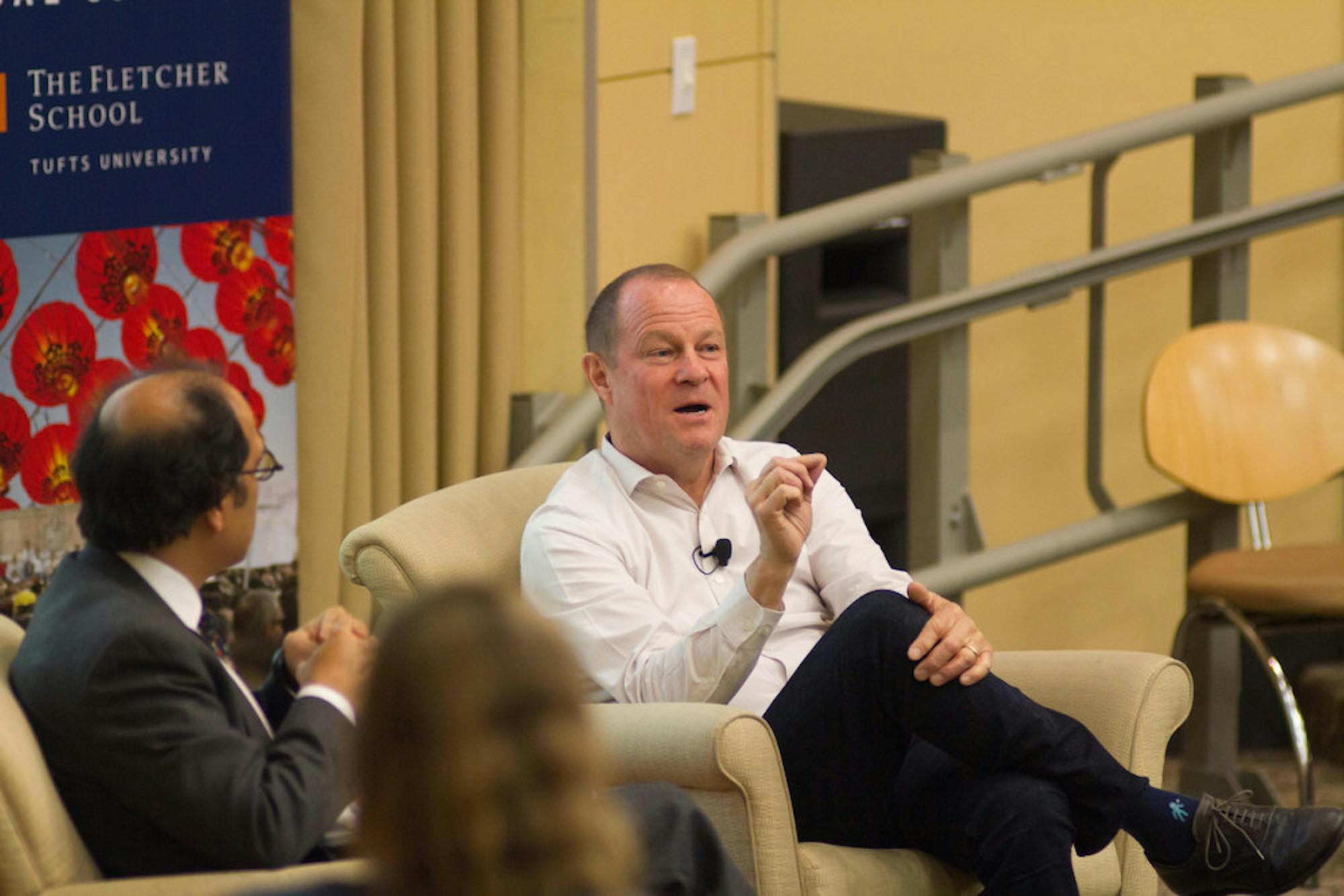The Fletcher School of Law & Diplomacy's Institute for Business in the Global Context (IBGC) Speaker Series hosted CEO of Gap Inc. Art Peck in ASEAN Auditorium on Oct. 19 for an event titled “Minding the Gap: The Art of Sustainable Leadership.”
The discussion, attended by about 50 people, kicked off with an introduction from IBGC Executive Director Bhaskar Chakravorti who described Peck’s trajectory in business. Peck spent 20 years in Boston Consulting Group before taking on various leadership roles in Gap Inc. and eventually arriving at his current position of CEO in February 2015.
Peck began his lecture by describing the dramatic changes happening within the apparel and retail industries, largely brought on by the advent of online shopping.
Despite challenges, Peck pointed out that the apparel industry was growing steadily for a myriad of reasons, not least of which is the basic human need for clothing.
“The good news about apparel ... is that everyone in this room is wearing clothing,” Peck said. “It’s a growing business and it’s a fundamental human need and so while the business is being disrupted it’s … a disruption that’s on the back of a very large and growing market.”
Continuing on the topic of growth, Peck described current "hotspots" in the industry and addressed how Gap Inc. was working to take advantage of each of them. Such areas of growth include China -- especially with the end of the one-child policy -- the digital market and athletic wear, he said.
Elaborating on the athletic wear market, Peck said that by the year 2020, one-third of all apparel spending will be on active and performance wear. Gap Inc. is focusing on developing pieces that look like day-to-day clothes but have the feel and comfort of athletic wear.
Peck then moved on to explain the growing importance of speed in the fashion and retail industries. In the past, Peck said, it would take 18 to 24 months for trends debuted at fashion weeks around the world to make their way to mass markets. Now it’s a matter of weeks, he said.
“You know today, New York Fashion Week is watched by 5 million people on their couch. It’s become an entertainment spectacle,” Peck said. “Today if you’re not in that at the same time it’s coming off the runway as a mass competitor, you’re not competing.”
This new stress on faster turnaround times has led Gap Inc. to investigate building factories in the Caribbean Basin instead of Southeast Asia so that products can be shipped from the producers to the consumers in the United States more quickly.
“If you’re not getting faster, you’re dead. That’s clear,” Peck said.
Peck moved on into a discussion on sustainability, saying that there were three different facets to the corporation's approach to the issue: environment, sourcing and workplace.
According to Peck, the majority of consumers see the fashion industry as wasteful and polluting. Furthermore, he said, most clothes are not recycled when people have finished with them. This is especially problematic when it comes to cotton clothing, Peck said, which takes large amounts of water and pesticides to cultivate, is often grown using exploitative labor practices and is rarely recycled.
“To dimensionalize the problem, Gap Inc. uses one percent of world’s cotton crop. One percent. So it’s a big number," he said. "Therefore we understand we have both an opportunity and responsibility to make progress on that."
The second branch of sustainability is sourcing, or where products come from and who makes them, Peck said. He continued by saying that while Gap Inc. is constantly working to improve the labor environments of all its vendors, it is not possible to oversee everything.
“We’re aware of the fact that we’re not going to be perfect and something bad is probably going to happen out there despite all the work we’re doing,” Peck said.
Peck wrapped up the discussion by touching on his personal life, saying it is essential to find a source of joy in one’s work, whether it be from the work itself, coworkers or the results work produces.
Peck offered advice to those in the room, most of whom were Fletcher students.
“Don’t let the plans stand in the way of the unexpected fork in the road … because many of the opportunities that have come my way and the opportunities they’ve afforded were unplanned and accidental,” he said.
CEO of Gap Inc. speaks at Fletcher about retail, apparel industries






